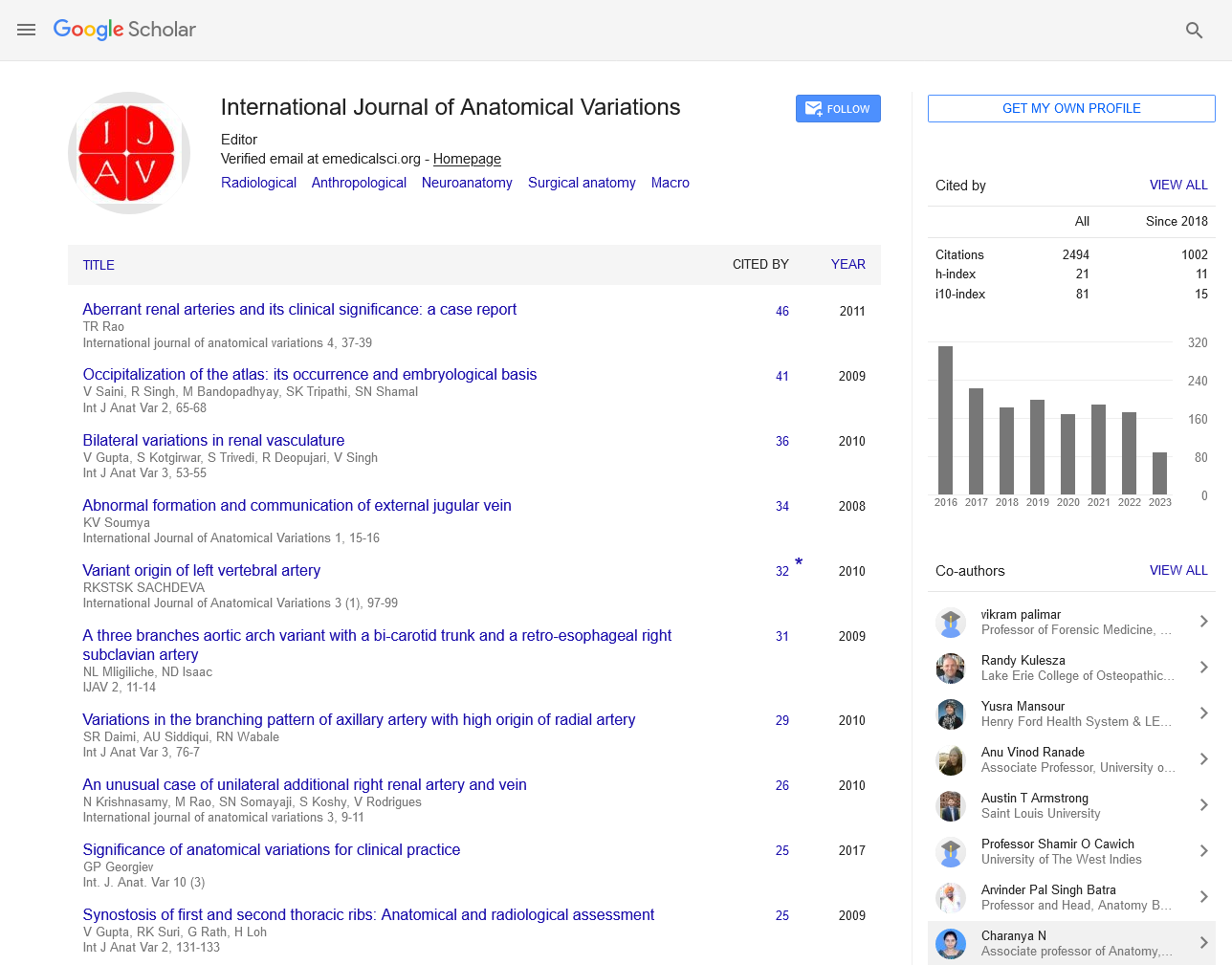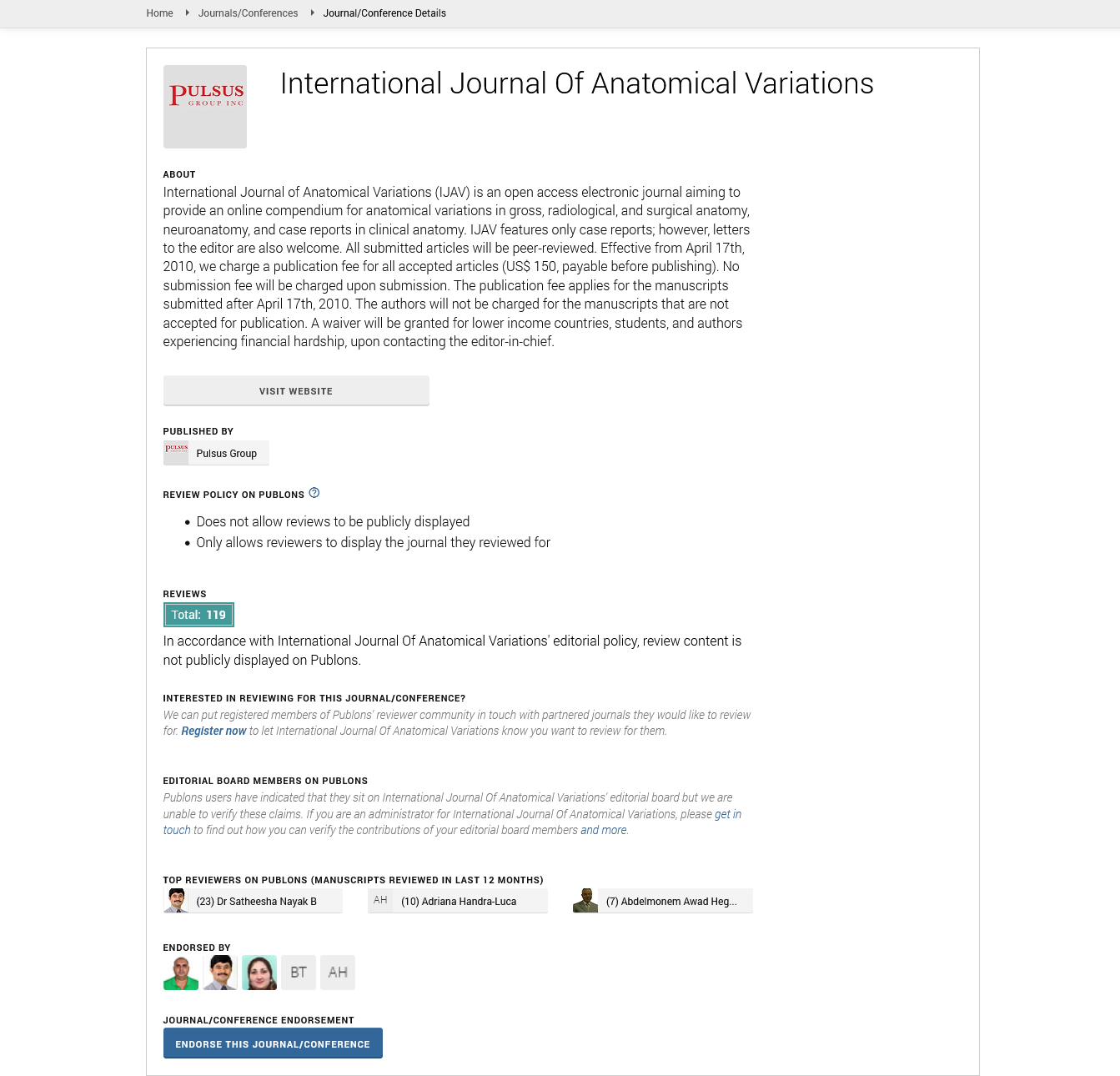Maintaining Your Body: A Guide to Organ Health and Well-being
Received: 02-Aug-2023, Manuscript No. ijav-23-6682; Editor assigned: 04-Aug-2023, Pre QC No. ijav-23-6682; Accepted Date: Aug 31, 2023; Reviewed: 18-Aug-2023 QC No. ijav-23-6682; Revised: 23-Aug-2023, Manuscript No. ijav-23-6682; Published: 31-Aug-2023, DOI: 10.37532/1308-4038.16(8).295
Citation: Taylor R. Maintaining Your Body: A Guide to Organ Health and Wellbeing. Int J Anat Var. 2023;16(8):367-368.
This open-access article is distributed under the terms of the Creative Commons Attribution Non-Commercial License (CC BY-NC) (http://creativecommons.org/licenses/by-nc/4.0/), which permits reuse, distribution and reproduction of the article, provided that the original work is properly cited and the reuse is restricted to noncommercial purposes. For commercial reuse, contact reprints@pulsus.com
Abstract
In today’s fast-paced world, the well-being of our organs often takes a backseat amidst the hustle and bustle of daily life. This article explores the vital importance of organ health and outlines a comprehensive approach to ensure their optimal functioning. By focusing on balanced nutrition, regular physical activity, stress management, quality sleep, and routine check-ups, individuals can cultivate a holistic lifestyle that supports the well-being of their heart, liver, kidneys, lungs, brain, and more. Recognizing the intricate interplay between these practices and organ health underscores the significance of nurturing our bodies for a healthier, more fulfilling life.
Keywords
Organ health; Heart; Liver
INTRODUCTION
In the In the intricate symphony of human biology, our organs play the role of instrumental virtuosos, each contributing its unique harmony to the grand composition of life. The heart’s rhythmic beat, the lungs’ oxygen ballet, the liver’s detoxifying overture, and the brain’s intricate sonata of thoughts – every organ is a masterpiece in itself. Yet, in the whirlwind of modern existence, these silent performers often find themselves in the shadows, grappling with the consequences of our demanding lifestyles.
It is no secret that our organs are the unsung heroes of our bodies, ceaselessly toiling to ensure our survival and vitality. Their remarkable efficiency can be attributed to an intricate network of interdependence. A misstep in one organ’s function can reverberate through the system, affecting others in a domino effect that compromises overall health. But how often do we pause to consider the remarkable concert these organs orchestrate daily, or the responsibility we hold in maintaining this delicate equilibrium?
This article delves into the crux of organ health – an often overlooked facet of wellness that is fundamental to our longevity and quality of life. With the advent of sedentary lifestyles, processed diets, and escalating stress levels, our organs face an uphill battle against a tidal wave of challenges. Yet, the beauty lies in our ability to rewrite this narrative. By cultivating an understanding of how our organs function and embracing practices that empower them, we can lead lives that are not just marked by survival, but by thriving in every sense of the word [1-3].
The journey to organ health is not merely about preservation; it is about recognizing the dynamic interplay between lifestyle choices and our body’s internal symphony. From the heart’s steadfast rhythm to the brain’s intricate cognition, each organ holds a story of resilience and adaptation. Our commitment to their well-being is a testament to our commitment to a life rich with experiences, energy, and fulfillment.
As we embark on this exploration, envision your organs as the pillars that uphold the temple of your existence. Just as a temple requires care and maintenance to stand the test of time, so do our bodies demand our attention, respect, and nurturing. In the pages that follow, we will uncover the profound impact of balanced nutrition, physical activity, stress management, restful sleep, and regular check-ups on the vitality of our organs. By embracing these pillars of organ health, we pave the way for a life that resonates with wellness on a holistic scale. It is a journey that extends beyond superficial appearances, inviting us to delve deeper into the symphony of our own bodies and emerge as conductors of our own well-being.
DISCUSSION
The human body is a marvel of complexity, composed of various organs working harmoniously to keep us alive and thriving. Each organ plays a unique role in maintaining our overall health and well-being. However, with the modern lifestyle characterized by poor dietary choices, sedentary habits, and stress, our organs can often bear the brunt of neglect, leading to various health issues. To ensure that your organs function optimally and remain in good health, it’s essential to adopt a holistic approach to wellness [4].
The foundation of organ health: The food we consume directly impacts our organs’ health. A balanced diet rich in essential nutrients is key to supporting organ function. Prioritize whole foods, including a variety of fruits, vegetables, lean proteins, whole grains, and healthy fats. These foods provide vitamins, minerals, and antioxidants that help protect organs from damage and support their proper functioning.
Heart: Reduce saturated and Trans fats, opt for heart-healthy fats like those found in avocados, nuts, and olive oil. Incorporate foods rich in omega-3 fatty acids, like fatty fish, to support cardiovascular health.
Liver: Limit excessive alcohol consumption and reduce processed foods. Include foods like leafy greens, beets, and cruciferous vegetables to aid liver detoxification.
Kidneys: Stay hydrated by drinking adequate water throughout the day. Avoid excessive salt intake, as it can strain the kidneys. Opt for low-sodium options and include foods like berries and citrus fruits to support kidney health.
Lungs: Consume foods rich in antioxidants, such as berries, citrus fruits, and green tea, to protect lung cells from oxidative stress. Avoid smoking and prioritize clean air environments [5-7].
Regular physical activity: a boost for organs: Physical activity is not only essential for maintaining a healthy weight but also crucial for optimal organ function. Regular exercise improves blood circulation, reduces the risk of chronic diseases, and supports overall well-being.
Heart: Engage in cardiovascular exercises like brisk walking, jogging, or cycling to strengthen the heart muscle and improve blood circulation.
Lungs: Incorporate aerobic exercises that challenge your lung capacity, such as swimming or dancing, to enhance lung function and oxygen exchange.
Digestive system: Maintain a healthy weight through exercise, which can help prevent digestive issues like acid reflux and constipation. Practices like yoga can also support digestion.
Brain: Physical activity stimulates brain health by promoting the growth of new neurons and enhancing cognitive function. Include activities like yoga, which combines movement with mindfulness.
Nurturing mind and body: Chronic stress can take a toll on various organs, contributing to health problems. Practicing stress-reduction techniques can significantly improve organ health.
Brain: Engage in meditation, mindfulness, or deep breathing exercises to reduce stress and promote brain health.
Heart: Stress management techniques like yoga and meditation can lower blood pressure and reduce the risk of heart disease.
Digestive System: Stress can disrupt digestion. Prioritize relaxation techniques and avoid eating in stressful environments.
Rejuvenation for organs: Adequate sleep is crucial for organ health as it allows the body to repair and rejuvenate. Aim for 7-9 hours of quality sleep each night.
Brain: During deep sleep, the brain clears toxins and consolidates memories. Prioritize a regular sleep schedule to support cognitive function.
Heart: Sleep deficiency is linked to an increased risk of cardiovascular issues. Quality sleep supports heart health by regulating blood pressure and reducing stress.
Endocrine system: Sleep influences hormonal balance. Disrupted sleep patterns can lead to imbalances in hormones that regulate appetite, metabolism, and stress [8].
Early detection and prevention: Regular medical check-ups are crucial for identifying potential organ-related issues early on. Routine screenings can help detect problems before they escalate, allowing for timely interventions.
Liver: Regular liver function tests can catch liver issues in their early stages, such as fatty liver disease.
Heart: Cholesterol and blood pressure checks can help assess cardiovascular health and identify risks.
Kidneys: Kidney function tests can detect any signs of kidney dysfunction, helping to prevent kidney diseases.
Lungs: Pulmonary function tests are useful for assessing lung health and detecting respiratory issues [9-10].
CONCLUSION
In conclusion, maintaining optimal organ health requires a holistic approach that encompasses balanced nutrition, regular exercise, stress management, quality sleep, and regular check-ups. By prioritizing these aspects of wellness, you can ensure that your organs function efficiently, supporting a vibrant and fulfilling life. Remember, your organs work tirelessly to keep you going – it’s only fair that you give them the care and attention they deserve.
REFERENCES
- Behravesh S, Yakes W, Gupta N. Venous malformations: clinical diagnosis and treatment. Cardiovasc Diagn Ther. 2016; 6(6):557-569.
- Kachlík D, Varga I, Báča V, Musil V. Variant Anatomy and Its Terminology. Medicina (Kaunas). 2020; 56(12).
- De Popas E, Brown M. Varicose Veins and Lower Extremity Venous Insufficiency. Semin Interv Radiol. 2018; 35(01):056-061.
- Kumar V, Abbas AK, Aster JC. Robbins and Cotran Pathologic Basis of Disease. 10th ed. Saunders Elsevier. 2021.
- Simpson W, Krakowsi D. Prevalence of lower extremity venous duplication. Indian J Radiol Imaging. 2010; 20(3):230.
- Chen CK, Kolber M. Venous popliteal entrapment syndrome. Cardiovasc Diagn Ther. 2021; 11(5):1168-1171.
- Raju S, Fountain T, Neglén P, Devidas M. Axial transformation of the profunda femoris vein. J Vasc Surg. 1998; 27(4):651-659.
- Faucett SC, Gannon J, Chahla J, Ferrari MB, LaPrade RF et al. Posterior Surgical Approach to the Knee. Arthrosc Tech. 2017; 6(2):e391-e395.
- Kim H, Yim N, Kim J, Kang Y, Jung H et al. Inferior vena cava filter insertion through the popliteal vein: enabling the percutaneous endovenous intervention of deep vein thrombosis with a single venous approach in a single session. Diagn Interv Radiol. 2016; 27(3):S287.
- Rohen JW, Chihiro Yokochi, Lütjen-Drecoll E. Photographic Atlas of Anatomy. 8th ed. Philadelphia Wolters Kluwer. 2016.
Indexed at, Google Scholar, Crossref
Indexed at, Google Scholar, Crossref
Indexed at, Google Scholar, Crossref
Indexed at, Google Scholar, CrossRef
Indexed at, Google Scholar, Crossref
Indexed at, Google Scholar, Crossref
Indexed at, Google Scholar, Crossref
Indexed at, Google Scholar, Crossref
Indexed at, Google Scholar, Crossref






